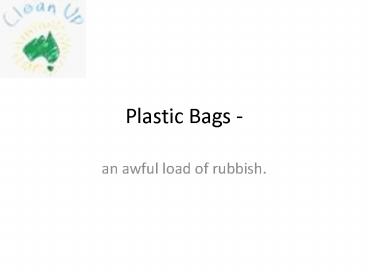Plastic Bags - - PowerPoint PPT Presentation
1 / 15
Title:
Plastic Bags -
Description:
Plastic Bags - an awful load of rubbish. What s the problem? Australians use more than 10 million new plastic shopping bags every day. That equates to 3.92 billion ... – PowerPoint PPT presentation
Number of Views:239
Avg rating:3.0/5.0
Title: Plastic Bags -
1
Plastic Bags -
- an awful load of rubbish.
2
Whats the problem?
3
- Australians use more than 10 million new plastic
shopping bags every day. - That equates to 3.92 billion plastic bags each
year. - Each year, the average household is responsible
for using 502 bags(1).
If these 3.92 billion plastic bags were tied
together, they would circle the globe 24 times!
4
- Australians dump 7,150 recyclable plastic bags
into landfills every minute
5
Clean Up Australia Day - statistics
- Each year, Clean Up Australia Day identifies
plastic as the major source of rubbish throughout
Australia. - We collect almost half a million plastic bags
each year. - Some one-third of all items collected are
plastic, with almost one in 10 of these being
plastic bags. - Did you know Australians are the second-highest
producers of waste per person, after the US?
6
Whats in a bag?
- There are 2 types of plastic bags
- 1. High Density Polyethylene (HDPE) bags thin
bags used by more than 80 of retailers. These
can be easily recycled. - 2. Low Density Polyethylene (LDPE) the thicker
bags often used in department and boutique
stores. While these bags can be recycled, there
are few collection points for recycling. - Be wary of biodegradable and degradable
plastic bags - Standards have only recently been developed for
biodegradable bags ask your retailer to show
that the bags have passed relevant international
standards. - Degradable bags just break into smaller pieces
and can be even more damaging to flora and fauna.
7
The effect on the environment
8
- There are about 46,000 pieces of plastic floating
in each square mile of our oceans. - It is estimated that plastic kills up to 1
million sea birds, 100,000 sea mammals and
countless fish each year.(2). - On one remote atoll - Midway Island - some 9 in
10 Albatross chicks had plastic bag remnants in
their gullets - and turtles, dolphins and killer
whales can choke or starve by confusing plastic
bags for jellyfish.
On one remote atoll - Midway Island - some 9 in
10 Albatross chicks had plastic bag remnants in
their gullets - and turtles, dolphins and killer
whales can choke or starve by confusing plastic
bags for jellyfish.
9
- ... Not to mention other environmental effects
- When oil, gas and coal are used to produce
plastic bags, they emit dangerous greenhouse
gasses. The burning of gasses also creates
emissions of toxic gasses, dioxins and heavy
metals. - Bags escape and float easily in air and water,
travelling long distances. - When animals which have ingested bags die and
decay, the plastic is free again to repeat the
deadly cycle. - Plastic bags last up to 1000 years and
accumulate at a staggering rate!
10
What can YOU do?
11
What you can do consumers
- Plastic bags can be returned to supermarkets for
recycling. - Most larger supermarkets recycle bags. If its
difficult to find the recycling bin, suggest that
it be put in a more visible place. - Green (polypropylene) bags can be recycled at
local councils or Coles and Bi-Lo stores. - OR you can also contact your local council to see
if they collect or have drop-off points for
recycling. - Councils, schools and community groups can sign
up as Ambassadors to run bag swaps, design
reusable bags and get local shops on board. - For free advice and promotional materials, sign
up at - http//www.cleanup.org.au/PDF/au/s-form.pdf or
go to - http//www.noplasticbags.org.au/home/default.asp
x
12
What you can do consumers cont.
- TIP Avoid using plastic bags as bin liners.
Simply put your rubbish straight into your
household bin and give the bin a quick rinse
afterwards, then reuse the water on your garden. - OR Three layers of broadsheet newspaper as a
bin liner can also work well. - TIP Before recycling, turn bags inside out and
remove any receipts and food scraps -
contamination can cause problems in production
and prevent recycled plastic from being used.
13
What you can do retailers
- Buy or produce your own reusable bags using our
Bag Selector. Materials include paper, calico,
polypropylene (green bags), starch-based
biodegradable and hemp. - These bags can be sold at a profit for only a
few dollars each. - Our preferred supplier is Adsun Ph (07) 3399
7933 www.adsun.com.au - or for other suppliers
- http//www.noplasticbags.org.au/alternatives/supp
lierDirectory.aspx
14
What you can do retailers
- Grab our Retailers Kit - 45 for a wealth of
info - Clean Up Australia has put together this
comprehensive Kit for organisations of any size
with tips on how to refuse, reduce, reuse and
recycle, with staff training materials and
in-store promotional items to generate action.
Download an order form at - http//cleanup.org.au/PDF/au/s-kit.pdf
15
- For more information www.cleanup.org.au
- www.cleanuptheworld.org

